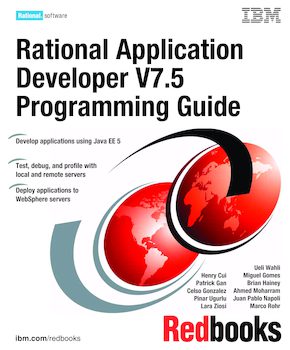Rational Application Developer V7.5 Programming Guide
An IBM Redbooks publication
Note: This is publication is now archived. For reference only.

Published on 30 June 2009
ISBN-10: 073843289X
ISBN-13: 9780738432892
IBM Form #: SG24-7672-00
Authors: Ueli Wahli, Miguel Vieira Ferreira Lopes Gomes, Brian Hainey, Ahmed Moharram, Juan Pablo Napoli, Marco Rohr, Henry Cui, Patrick Gan, Celso Gonzalez, Pinar Ugurlu and Lara Ziosi
IBM® Rational® Application Developer for WebSphere® Software v7.5 (Application Developer, for short) is the full function Eclipse 3.4 based development platform for developing Java™ Standard Edition Version 6 (Java SE 6) and Java Enterprise Edition Version 5 (Java EE 5) applications with a focus on applications to be deployed to IBM WebSphere Application Server and IBM WebSphere Portal. Rational Application Developer provides integrated development tools for all development roles, including Web developers, Java developers, business analysts, architects, and enterprise programmers.
Rational Application Developer is part of the IBM Rational Software Delivery Platform (SDP), which contains products in four life cycle categories:
- Architecture management, which includes integrated development environments
- Change and release management
- Process and portfolio management
- Quality management
This IBM Redbooks™ publication is a programming guide that highlights the features and tooling included with Rational Application Developer v7.5. Many of the chapters provide working examples that demonstrate how to use the tooling to develop applications, as well as achieve the benefits of visual and rapid application development.
This publication is an update of Rational Application Developer V7 Programming Guide, SG24-7501.
Part 1. Introduction to Rational Application Developer
Chapter 1. Introduction
Chapter 2. Programming technologies
Chapter 3. Workbench setup and preferences
Chapter 4. Perspectives, views, and editors
Chapter 5. Projects
Part 2. Architecture and modeling
Chapter 6. RUP, patterns, and SOA
Chapter 7. Unified Modeling Language (UML)
Part 3. Basic Java and XML development
Chapter 8. Developing Java applications
Chapter 9. Accelerating development using patterns
Chapter 10. Developing XML applications
Part 4. Persistence application development
Chapter 11. Developing database applications
Chapter 12. Persistence using the Java Persistence API (JPA)
Part 5. Enterprise application development
Chapter 13. Developing Web applications using JSPs and servlets
Chapter 14. Developing EJB applications
Chapter 15. Developing Web applications using Struts
Chapter 16. Developing Web applications using JSF
Chapter 17. Developing Java EE application clients
Chapter 18. Developing Web services applications
Chapter 19. Developing Web applications using Web 2.0
Chapter 20. Developing applications to connect to enterprise information systems
Chapter 21. Developing portal applications
Part 6. Testing and debugging applications
Chapter 22. Servers and server configuration
Chapter 23. Testing using JUnit
Chapter 24. Debugging local and remote applications
Part 7. Deploying and profiling applications
Chapter 25. Building applications with Ant
Chapter 26. Deploying enterprise applications
Chapter 27. Profiling applications
Part 8. Management and team development
Chapter 28. CVS integration
Chapter 29. Rational Team Concert
Appendix A. Product installation
Appendix B. Additional material